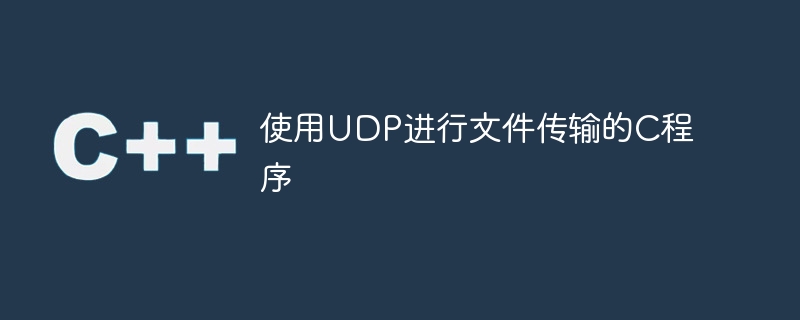

数据可以在两台使用 C 语言实现 Socket 编程的计算机之间传输。
在同样的情况下,可以轻松地通过实现用户数据报协议 (UDP) 和 简单的客户端/服务器。
安全性 - 通过加密处理。
协议 - UDP
加密 - 异或加密
服务器启动并等待文件名。
客户端发送文件名。
该文件名由服务器接收。如果文件存在,服务器开始读取文件,并继续发送一个填充有加密文件内容的缓冲区,直到到达文件末尾。
文件结尾标记为EOF。
文件将作为缓冲区接收,直到且除非收到 EOF。之后对其进行加密。
如果文件不存在,则会发送一条消息“找不到文件”。
// server code for UDP socket programming
#include <arpa/inet.h>
#include <netinet/in.h>
#include <stdio.h>
#include <stdlib.h>
#include <string.h>
#include <sys/socket.h>
#include <sys/types.h>
#include <unistd.h>
#define IP_Protocol 0
#define Port_No 15050
#define Net_Buf_Size 32
#define CipherKey 'S'
#define SendRecvFlag 0
#define NoFile "File Not Found!"
// function for clearing buffer
void clearBuf(char* b1){
int i;
for (i = 0; i < Net_Buf_Size; i++)
b1[i] = '\0';
}
// function for encryption method
char Cipher(char ch1){
return ch1 ^ CipherKey;
}
// function for sending file
int sendFile(FILE* fp1, char* buf1, int s1){
int i, len;
if (fp1 == NULL) {
strcpy(buf1, NoFile);
len = strlen(NoFile);
buf1[len] = EOF;
for (i = 0; i <= len; i++)
buf1[i] = Cipher(buf1[i]);
return 1;
}
char ch1, ch2;
for (i = 0; i < s1; i++) {
ch1= fgetc(fp);
ch2 = Cipher(ch1);
buf1[i] = ch2;
if (ch1 == EOF)
return 1;
}
return 0;
}
// driver code
int main(){
int sockfd1, nBytes;
struct sockaddr_in addr_con;
int addrlen = sizeof(addr_con);
addr_con.sin_family = AF_INET;
addr_con.sin_port = htons(Port_No);
addr_con.sin_addr.s_addr = INADDR_ANY;
char net_buf1[Net_Buf_Size];
FILE* fp1;
// socket()
sockfd1 = socket(AF_INET, SOCK_DGRAM, IP_Protocol);
if (sockfd1 < 0)
printf("</p><p>file descriptor is not received!!</p><p>");
else
printf("</p><p>file descriptor %d is received</p><p>", sockfd1);
// bind()
if (bind(sockfd1, (struct sockaddr*)&addr_con,
sizeof(addr_con)) == 0)
printf("</p><p>Successfully is binded!</p><p>");
else
printf("</p><p>Binding is Failed!</p><p>");
while (1) {
printf("</p><p>Waiting for name of file...</p><p>");
// receive name of file
clearBuf(net_buf1);
nBytes = recvfrom(sockfd1, net_buf1,
Net_Buf_Size, SendRecvFlag,
(struct sockaddr*)&addr_con,
&addrlen);
fp1 = fopen(net_buf1, "r");
printf("</p><p>File Name is Received: %s</p><p>", net_buf1);
if (fp1 == NULL)
printf("</p><p>File open is failed!</p><p>");
else
printf("</p><p>File Successfully is opened!</p><p>");
while (1) {
// process
if (sendFile(fp1, net_buf1, Net_Buf_Size)) {
sendto(sockfd1, net_buf1, Net_Buf_Size,
SendRecvFlag,
(struct sockaddr*)&addr_con,
addrlen);
break;
}
// send
sendto(sockfd1, net_buf1, Net_Buf_Size,
SendRecvFlag,
(struct sockaddr*)&addr_con, addrlen);
clearBuf(net_buf1);
}
if (fp1 != NULL)
fclose(fp1);
}
return 0;
}
// client code for UDP socket programming
#include <arpa/inet.h>
#include <netinet/in.h>
#include <stdio.h>
#include <stdlib.h>
#include <string.h>
#include <sys/socket.h>
#include <sys/types.h>
#include <unistd.h>
#define IP_Protocol 0
#define IP_Address "127.0.0.1" // localhost
#define Port_No 15050
#define Net_Buf_Size 32
#define CipherKey 'S'
#define SendRecvFlag 0
// function for clearing buffer
void clearBuf(char* b1){
int i;
for (i = 0; i < Net_Buf_Size; i++)
b1[i] = '\0';
}
// function for decryption method
char Cipher(char ch1){
return ch1 ^ CipherKey;
}
// function for receiveing file
int recvFile(char* buf1, int s1)
{
int i;
char ch1;
for (i = 0; i < s1; i++) {
ch1 = buf1[i];
ch1 = Cipher(ch1);
if (ch1 == EOF)
return 1;
else
printf("%c", ch1);
}
return 0;
}
// driver code
int main(){
int sockfd1, nBytes;
struct sockaddr_in addr_con;
int addrlen = sizeof(addr_con);
addr_con.sin_family = AF_INET;
addr_con.sin_port = htons(Port_No);
addr_con.sin_addr.s_addr = inet_addr(IP_Address);
char net_buf1[Net_Buf_Size];
FILE* fp1;
// socket()
sockfd1 = socket(AF_INET, SOCK_DGRAM,
IP_Protocol);
if (sockfd1 < 0)
printf("</p><p>file descriptor is not received!!</p><p>");
else
printf("</p><p>file descriptor %d is received</p><p>", sockfd1);
while (1) {
printf("</p><p>Please enter the name of file to receive:</p><p>");
scanf("%s", net_buf1);
sendto(sockfd1, net_buf1, Net_Buf_Size,
SendRecvFlag, (struct sockaddr*)&addr_con,
addrlen);
printf("</p><p>---------Data is Received---------</p><p>");
while (1) {
// receive
clearBuf(net_buf1);
nBytes = recvfrom(sockfd1, net_buf1, Net_Buf_Size,
SendRecvFlag, (struct
sockaddr*)&addr_con,
&addrlen);
// process
if (recvFile(net_buf1, Net_Buf_Size)) {
break;
}
}
printf("</p><p>-------------------------------</p><p>");
}
return 0;
}Ce qui précède est le contenu détaillé de. pour plus d'informations, suivez d'autres articles connexes sur le site Web de PHP en chinois!
 Nom de domaine de site Web gratuit
Nom de domaine de site Web gratuit
 qu'est-ce qu'un programme vb
qu'est-ce qu'un programme vb
 Nettoyer le registre
Nettoyer le registre
 Comment obtenir le numéro de série d'un disque dur physique sous Windows
Comment obtenir le numéro de série d'un disque dur physique sous Windows
 Que se passe-t-il lorsque phpmyadmin ne peut pas y accéder ?
Que se passe-t-il lorsque phpmyadmin ne peut pas y accéder ?
 Comment effacer le constructeur de chaînes
Comment effacer le constructeur de chaînes
 Solution http500
Solution http500
 l'espacement des lettres
l'espacement des lettres